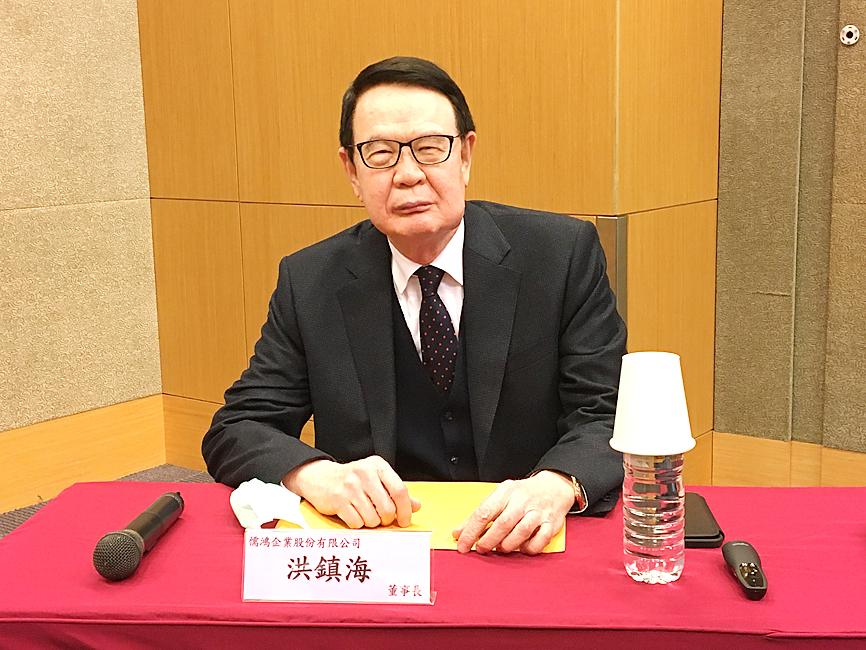Garment and fabric supplier Eclat Textile Co (儒鴻) yesterday said that its revenue is likely to increase by a double-digit percentage this quarter, thanks to rising demand from major clients such as Nike Inc and Under Armour Inc.
The company has clear order visibility through the first 10 months of this year at least, Eclat chairman Hung Chen-hai (洪鎮海) told investors.
“In the first quarter, it is 100 percent sure that our revenue will grow by a double-digit percentage,” Hung said. “If we can ship all products smoothly based on orders in hand, revenue is likely to climb to a record high this year.”

Photo: CNA
The firm posted revenue of NT$28.18 billion (US$992.6 million) for last year, up 0.18 percent from NT$28.13 billion in 2019.
Revenue last month expanded 28.6 percent year-on-year to NT$2.32 billion, bringing its revenue in the first two months to NT$5.11 billion, up 24.32 percent year-on-year.
However, a shortage of shipping containers is delaying about 10 to 12 percent of exports each month, creating uncertainty, Hung said.
Hung dismissed speculation about disruption to the supply of nylon, as well as increased prices of spandex and other types of fiber due to factory closures in Texas after cold weather.
However, he said that prices of certain fibers have risen by 10 to 15 percent.
Eclat posted a net profit of NT$4.25 billion for last year, slightly lower than the NT$4.30 billion it reported in 2019.
Earnings per share fell to NT$15.51 from NT$15.67, while gross margin slid to 28.67 percent from 28.85 percent, company data showed.

Taiwan Semiconductor Manufacturing Co (TSMC, 台積電) secured a record 70.2 percent share of the global foundry business in the second quarter, up from 67.6 percent the previous quarter, and continued widening its lead over second-placed Samsung Electronics Co, TrendForce Corp (集邦科技) said on Monday. TSMC posted US$30.24 billion in sales in the April-to-June period, up 18.5 percent from the previous quarter, driven by major smartphone customers entering their ramp-up cycle and robust demand for artificial intelligence chips, laptops and PCs, which boosted wafer shipments and average selling prices, TrendForce said in a report. Samsung’s sales also grew in the second quarter, up

On Tuesday, US President Donald Trump weighed in on a pressing national issue: The rebranding of a restaurant chain. Last week, Cracker Barrel, a Tennessee company whose nationwide locations lean heavily on a cozy, old-timey aesthetic — “rocking chairs on the porch, a warm fire in the hearth, peg games on the table” — announced it was updating its logo. Uncle Herschel, the man who once appeared next to the letters with a barrel, was gone. It sparked ire on the right, with Donald Trump Jr leading a charge against the rebranding: “WTF is wrong with Cracker Barrel?!” Later, Trump Sr weighed

HEADWINDS: Upfront investment is unavoidable in the merger, but cost savings would materialize over time, TS Financial Holding Co president Welch Lin said TS Financial Holding Co (台新新光金控) said it would take about two years before the benefits of its merger with Shin Kong Financial Holding Co (新光金控) become evident, as the group prioritizes the consolidation of its major subsidiaries. “The group’s priority is to complete the consolidation of different subsidiaries,” Welch Lin (林維俊), president of the nation’s fourth-largest financial conglomerate by assets, told reporters during its first earnings briefing since the merger took effect on July 24. The asset management units are scheduled to merge in November, followed by life insurance in January next year and securities operations in April, Lin said. Banking integration,

LOOPHOLES: The move is to end a break that was aiding foreign producers without any similar benefit for US manufacturers, the US Department of Commerce said US President Donald Trump’s administration would make it harder for Samsung Electronics Co and SK Hynix Inc to ship critical equipment to their chipmaking operations in China, dealing a potential blow to the companies’ production in the world’s largest semiconductor market. The US Department of Commerce in a notice published on Friday said that it was revoking waivers for Samsung and SK Hynix to use US technologies in their Chinese operations. The companies had been operating in China under regulations that allow them to import chipmaking equipment without applying for a new license each time. The move would revise what is known